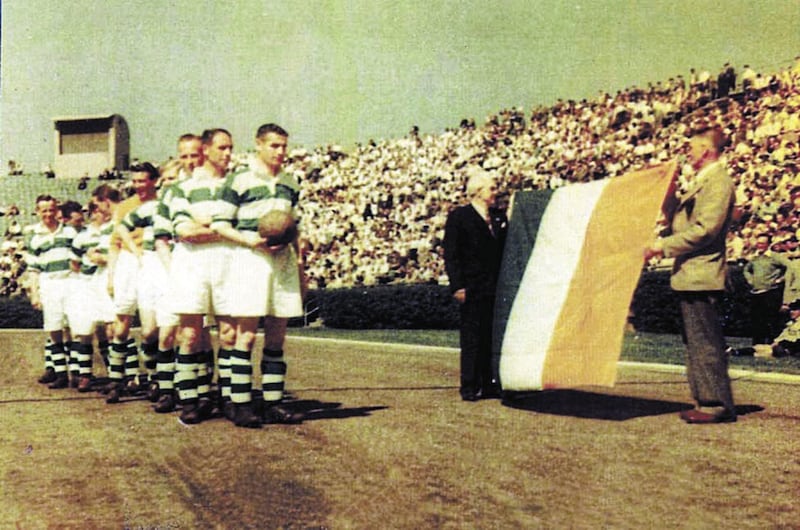Last week Micheál Martin told The Irish News he was “concerned that sport is becoming an issue of contention and it shouldn’t be”.
He was talking of course about Casement Park and his government’s €50 million grant towards rebuilding. His remarks prompt an obvious reaction: is he for real? Does he know anything at all about the north? Maybe he hit his head on something?
Sport has always been ‘an issue of contention’ here as elsewhere – think of all the battles royal between soccer fans across Europe – but it’s doubly contentious here. Professor Diarmaid Ferriter pointed out in a recent article that a 2001 assembly paper showed that “a wealth of distinguished research exists regarding the issue of sectarianism and sport” in the north.
First there’s the element of sectarian strife but secondly, and more pervasive, are the outward and visible symbols of national allegiance and identity portrayed by different sports: flags, anthems.

Partition of course made sectarian strife worse. Unionists established teams and organisations presenting the north as a separate entity – ‘our wee country’ – splitting from all-Ireland based sport, developing exclusive unionism. Thus you had ‘Ulster’ this and ‘Ulster’ that confined to the six counties only. That enhanced sectarianism. Only rare national examples like rugby survived partition.
Not content with splitting from nationally-organised sport, unionists sought to take total ownership of all sports here, especially soccer. That’s why Belfast Celtic was driven out of football in 1949 after years of intimidation, its players and supporters seriously assaulted on and off the pitch.

Two philosophy professors, Jake Wojtowicz and Alfred Archer, co-authors of Why It’s OK To Be a Sports Fan, wrote that sports fans form an “imagined community sharing values, their sense of who they are, and what they find important, a sense of being part of a collective with distinctive norms, that pursues common goals, conferring a stable sense of group identity and trust, how they see themselves and the world”. There’s no room in there for people who have an alternative view of the world that repudiates unionists’ imagined ‘wee country’.
Therefore rivalry with an opposing football team with its own loyalties, shared values and heroes is one thing and can be ferocious and virulent, but rivalry with another sport, a different code, is much more elemental.
Unionists tend to see the GAA not as a sporting code but as a manifestation of Irishness, a political and existential threat, ‘the other’. You can see in the social media maelstrom around Casement Park that the depth of ignorance about the GAA among unionists induces fear and visceral loathing. These attitudes to some extent explain the discrimination the GAA has suffered in the past from unionist councils and the NIO, its members murdered, assaults by the unionist militia, the UDR, occupation and damage to grounds by the British army.
From its inception in 1953 Casement Park was seen by unionists as an intrusion of Irishness into ‘their’ city. They could ignore minor local pitches but a big stadium holding 25,000-odd was another matter. For some years members of local GAA clubs with hurleys had to do shifts on a Saturday night to protect Casement from unionists trying to burn the posts or damage the pitch.

Belfast is no longer a unionist city. A top-class stadium is an opportunity to show unionists what the GAA is not. It’s not a threat to unionists’ way of life. It’s not a secretive, arcane political front. It’s not an intrusion of Irishness into a unionist state. It’s an outward looking, charitable, community sports and cultural organisation that pervades every town and village on this island; far and away the biggest sporting organisation on the island and in the north with hundreds of matches played every weekend from under-6s to county level.
Unionists tend to see the GAA not as a sporting code but as a manifestation of Irishness, a political and existential threat, ‘the other’. You can see in the social media maelstrom around Casement Park that the depth of ignorance about the GAA among unionists induces fear and visceral loathing
Objectively, no government could not but fund such an organisation that contributes so much to society. For all these reasons it’s essential that the British government makes good its stated promise to fund a new top class stadium. Jarlath Burns was entirely correct on Monday to insist the British must deliver, citing the proconsul’s remark: “We’ll get the money, don’t you worry.”
Public statements by unionist politicians have led to polling showing most unionists oppose using Casement for the Euros. There’s no doubt that the DUP is lobbying the British strenuously against Casement. However, this matter is bigger than DUP prejudice and ignorance. It’s an opportunity to bring in millions of pounds from the Euros, yes, but also from major concerts and other events for which Belfast has no venue leaving people having to travel to Dublin.
Finally, it’s a matter of equality of status and parity of esteem long denied for the biggest sporting and cultural community in the north. Do its members across the north not contribute to the public purse too?









